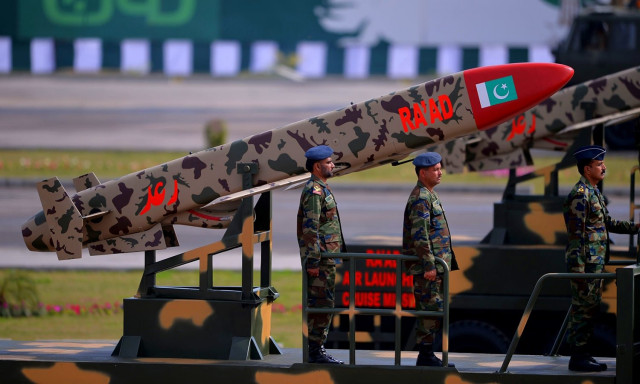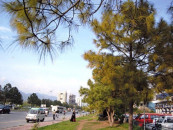US urged to support arms control between Pakistan, India
Experts tell American lawmakers that they need to tread fine line with Islamabad

Pakistani army soldiers travel on a vehicle carrying cruise missile Ra'ad during the Pakistan Day military parade in Islamabad on March 23, 2016. PHOTO: AFP
Pakistan National Day commemorates the passing of the Lahore Resolution, when a separate nation for the Muslims of The British Indian Empire was demanded on March 23, 1940. / AFP PHOTO / AAMIR QURESHI
They further warned about the frazzled relationship with Islamabad noting that there was a cyclical pattern of ‘booms’ and ‘busts’ in their bilateral ties. Both sides had a deep rooted mistrust for the other where both looking only through their preferred strategic prism.
Pakistan’s nuclear assets safe from terrorists, says foreign secretary
“Little the United States has tried—both in terms of sanctions and inducements—has had an appreciable impact on the scope and scale of Pakistan’s nuclear development,” said Toby Dalton, the co-director of nuclear policy programme at the Carnegie Endowment for International Peace.
“Recognising that the US options and leverage are quite limited, an alternative approach would be to support the development of an Indian and Pakistani logic of managing their security competition through negotiated limitations on nuclear and military capabilities and postures,” he told a hearing of the US Senate Committee on Foreign Relations on Thursday.
Reviewing Pakistan’s nuclear doctrine, the expert said that atomic weapons remain central to Islamabad’s “security-seeking behaviour in a region it considers to be enduringly hostile”.
US exploring deal to limit Pakistan's nuclear arsenal
With India expanding its defence spending and then striking a strategic cooperation with the US, Dalton said it prompted Pakistan to shift towards nuclear weapons as a deterrent for all threats from India – which is also looking to expand its own nuclear arsenal.
“The sum of these developments is a region with multiple potential sources of conflict, unclear nuclear redlines, and considerable room for miscalculation,” Dalton said warning that there is no shared sense of where these redlines might be drawn.
Published in The Express Tribune, September 9th, 2016.



















COMMENTS
Comments are moderated and generally will be posted if they are on-topic and not abusive.
For more information, please see our Comments FAQ